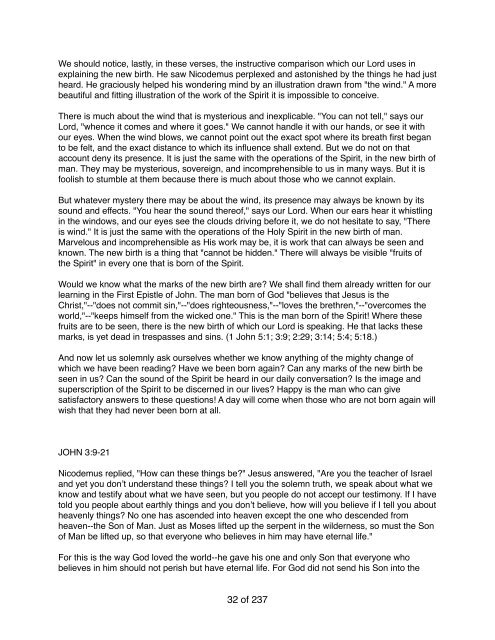J. C. Ryle John
John Charles Ryle (May 10, 1816 - June 10, 1900) was an evangelical Anglican clergyman and first Bishop of Liverpool. He was renowned for his powerful preaching and extensive tracts.
John Charles Ryle (May 10, 1816 - June 10, 1900) was an evangelical Anglican clergyman and first Bishop of Liverpool. He was renowned for his powerful preaching and extensive tracts.
You also want an ePaper? Increase the reach of your titles
YUMPU automatically turns print PDFs into web optimized ePapers that Google loves.
We should notice, lastly, in these verses, the instructive comparison which our Lord uses in<br />
explaining the new birth. He saw Nicodemus perplexed and astonished by the things he had just<br />
heard. He graciously helped his wondering mind by an illustration drawn from "the wind." A more<br />
beautiful and fitting illustration of the work of the Spirit it is impossible to conceive.<br />
There is much about the wind that is mysterious and inexplicable. "You can not tell," says our<br />
Lord, "whence it comes and where it goes." We cannot handle it with our hands, or see it with<br />
our eyes. When the wind blows, we cannot point out the exact spot where its breath first began<br />
to be felt, and the exact distance to which its influence shall extend. But we do not on that<br />
account deny its presence. It is just the same with the operations of the Spirit, in the new birth of<br />
man. They may be mysterious, sovereign, and incomprehensible to us in many ways. But it is<br />
foolish to stumble at them because there is much about those who we cannot explain.<br />
But whatever mystery there may be about the wind, its presence may always be known by its<br />
sound and effects. "You hear the sound thereof," says our Lord. When our ears hear it whistling<br />
in the windows, and our eyes see the clouds driving before it, we do not hesitate to say, "There<br />
is wind." It is just the same with the operations of the Holy Spirit in the new birth of man.<br />
Marvelous and incomprehensible as His work may be, it is work that can always be seen and<br />
known. The new birth is a thing that "cannot be hidden." There will always be visible "fruits of<br />
the Spirit" in every one that is born of the Spirit.<br />
Would we know what the marks of the new birth are? We shall find them already written for our<br />
learning in the First Epistle of <strong>John</strong>. The man born of God "believes that Jesus is the<br />
Christ,"--"does not commit sin,"--"does righteousness,"--"loves the brethren,"--"overcomes the<br />
world,"--"keeps himself from the wicked one." This is the man born of the Spirit! Where these<br />
fruits are to be seen, there is the new birth of which our Lord is speaking. He that lacks these<br />
marks, is yet dead in trespasses and sins. (1 <strong>John</strong> 5:1; 3:9; 2:29; 3:14; 5:4; 5:18.)<br />
And now let us solemnly ask ourselves whether we know anything of the mighty change of<br />
which we have been reading? Have we been born again? Can any marks of the new birth be<br />
seen in us? Can the sound of the Spirit be heard in our daily conversation? Is the image and<br />
superscription of the Spirit to be discerned in our lives? Happy is the man who can give<br />
satisfactory answers to these questions! A day will come when those who are not born again will<br />
wish that they had never been born at all.<br />
JOHN 3:9-21<br />
Nicodemus replied, "How can these things be?" Jesus answered, "Are you the teacher of Israel<br />
and yet you don’t understand these things? I tell you the solemn truth, we speak about what we<br />
know and testify about what we have seen, but you people do not accept our testimony. If I have<br />
told you people about earthly things and you don’t believe, how will you believe if I tell you about<br />
heavenly things? No one has ascended into heaven except the one who descended from<br />
heaven--the Son of Man. Just as Moses lifted up the serpent in the wilderness, so must the Son<br />
of Man be lifted up, so that everyone who believes in him may have eternal life."<br />
For this is the way God loved the world--he gave his one and only Son that everyone who<br />
believes in him should not perish but have eternal life. For God did not send his Son into the<br />
32 of 237




